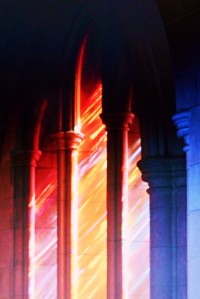I’ve gotta get outta here. Now.
I’m shaking, and so sorry I’d paid any attention to this sudden urge.
On a lark, I’d checked the Yellow Pages for churches in my area. No way I’d find a Lutheran church this close to Mexico, right? But there it was, listed under Santa Fe. Curious, I headed out to see it.
What crazy urge had led me to believe I’d find a New England style-looking Lutheran church in New Mexico? This church was a brown box with cross on top. Yearning still, I walked inside the house of worship, hoping to rekindle a childhood memory of Christmas Eve’s past.
Forget dark ambience, all-wood vaulted ceiling, stained glass windows, and stubby pew pencils Lutherans were famous for providing congregations. The interior here was white-walled sterility.
Even the program was different. On the first page, the opening hymn had been scrapped, replaced by a song from some guy named “Paul Stookey.”
I sat to think a second. Could this be the same Paul Stookey of Peter, Paul and Mary fame? The famous Peter, Paul and Mary characters not in the Bible, ones I’d been forced to study in catechism class? Was there a cover charge at the door tonight I didn’t know about?
Sure enough, five minutes later, “Paul Stookey” stood before the congregation and sang. He looked like Stookey, sang like Stookey, thus, had to be Stookey. An actual celebrity was here among us, and he was Lutheran. I didn’t know Lutherans were allowed to become celebrities.
The wooden pew I sat in, the only truly authentic element I could spot from my boyhood church recollections, warmed me to the church’s modern thing going on. Completely scrapped hymns. Hip musicians. Hip songs. Relaxed dress code. Brighter ambiance. Bring it on.
Then the minister took over. Standing at the pulpit, he pumped out the day’s Bible reading, the Gospel, the Epistle – “Oh, brother on high,” this, “Oh, brother on high,” that. Trapped, I left his tiring, pious world for a far loftier one by humming “Leaving on a Jet Plane” for fifteen minutes straight.
After the minister left the podium, the congregation stood. All hands enveloped open hymnals while open mouths poured out the song’s first line, O little town of Bethlehem, how still we see thee lie ….
Tingles went up the back of my head. My chest constricted, as if the pews were grabbing hold of me and wouldn’t let go.
Above your deep and dreamless sleep / The silent stars go by. / Yet in thy dark streets shineth / The everlasting light. / The hopes and fears of all the years / Are met in thee tonight.
Images poured in. Our Christmas tree. The dark Christmas Eve sky and all its stars. Siblings Don, Doug and Cathy opening presents beside me on the basement floor. Mom looking happy. Dad acting happy. Eggnog overflowing. All other days of the year forgotten for this one moment. As various reflections on Mom and Dad lingered, I realized how much I missed my parents, and how much I loved them, or desperately tried to.
My eyes welled from hearing the tune. I couldn’t let people see me cry. I must not let them see my cry.
I bit my lip. I stared at the walls. I breathed deeply. I reviewed the upcoming Sunday NFL schedule. I toured the inside of my bank.
It was the bank tour that did it. I needed every image of cold teller cubicles and financial offices to block my feelings. I’d won, although wondered why a tender melody should cause such turbulence.
Tired, wounded from fatigue, I hoped to rest during the sermon. But the minister pounded his “Oh, brother” message over and over again.
I shot back with multiple rounds of “If I Had a Hammer.” Unfortunately, humming “Hammer” was tiring, too. Wrecked, exhausted, I closed my eyes.
Go forward, go hide. Go fight, go rest. Go feel, go numb. Mom, Dad. Then, now. Block, release. Religion, self-determination.
I opened my eyes. It dawned on me the fire of religion had drawn out just about every conceivable emotion in me during childhood. Living in our suppressed family household, had religion been a good thing to experience after all? Even now? Something from religion had to have been good for me, right?
A book cracked. The man next to me opened his hymnal to Hymn number 646. “Silent Night.” The “Silent Night.” I grabbed hold of the pew like I’d never let go.
Silent night, holy night. All is calm, all is bright.
Just two lines, and I surrendered the fight.
I give in to all of what “Silent Night” meant to me. Its timeless melody put my body at total rest, mind at ease, and eyes in a place to shed their load, and, for one moment, blended all the good I’d ever known about church into one experience of blessed musical sounds, not to mention a little revisionist’s history. It’s as if someone from the back row had been saying, “It’s the music, brother – it’s music!”
This was a personal essay based on an episode in my memoir, “Maybe Boomer.”
Photo: Don Andberg


